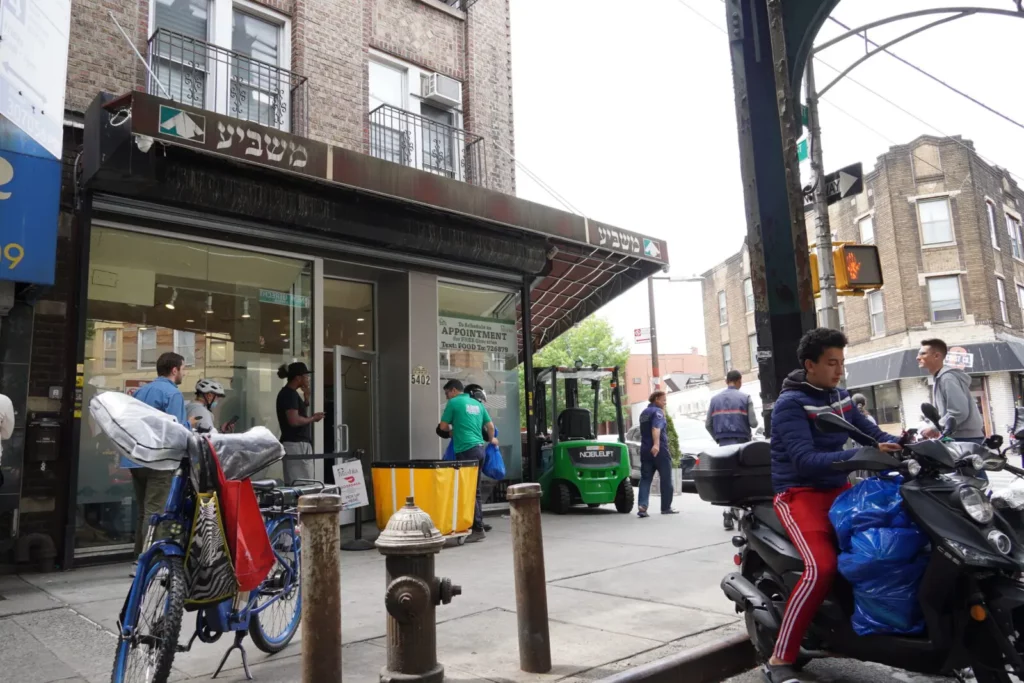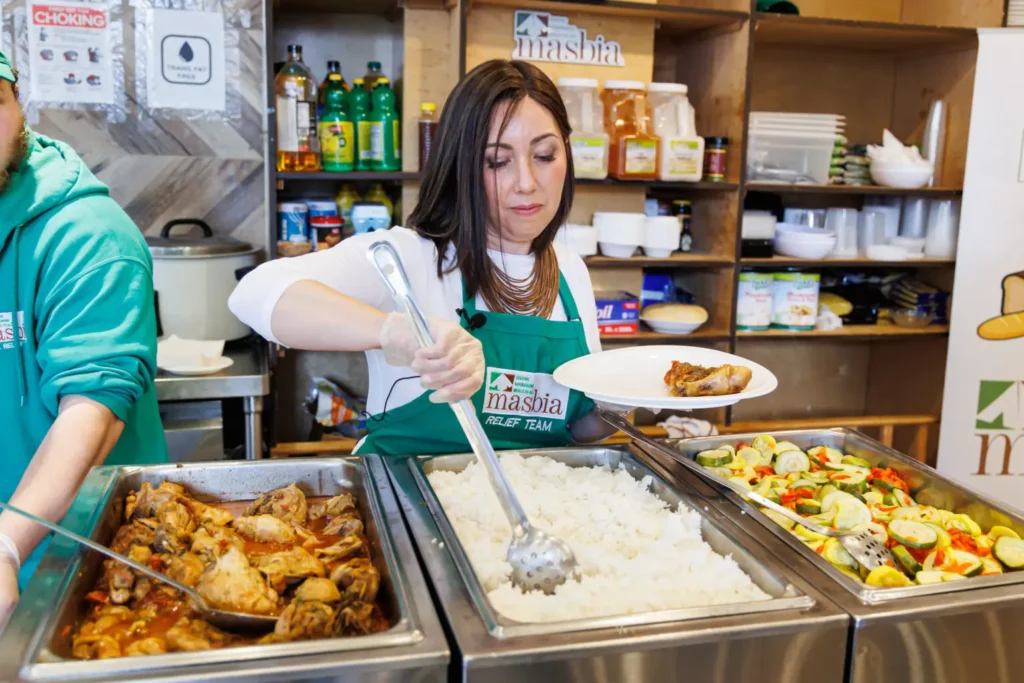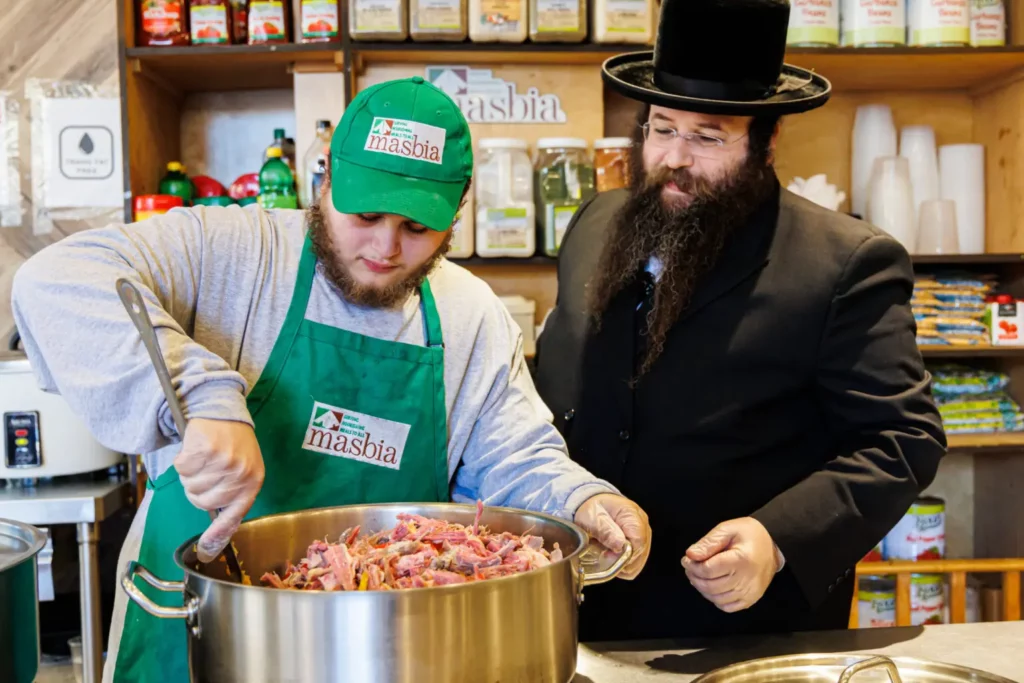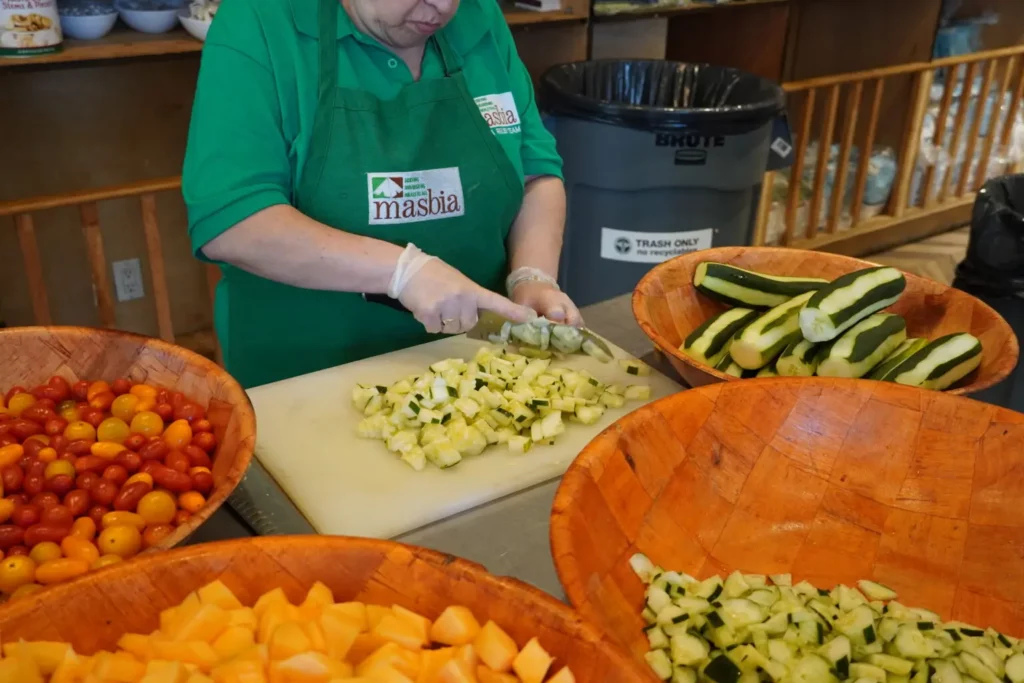Read the article below, written by Anna Rahmanan, in the Brooklyn Magazine, about Masbia Soup Kitchen Network in Boro Park, dealing with the negative stereotype of soup kitchens. Our ED, Alexander Rapaport, explains how Masbia has shaped the neighborhood and, in turn, the overall image of the local Jewish community in countless ways that go way beyond the business’ brick-and-mortar space.
Masbia In Brooklyn Magazine: Inside The Only Kosher Soup Kitchen In Brooklyn
Posted on: July 8, 2023
Masbia in Boro Park (Courtesy Masbia)
In addition to providing food to those in need, Masbia in Boro Park is shaping the community around it
It is a weekday afternoon in Boro Park. A visit to Masbia, one of the many Jewish storefronts in the area, kicks off with the sorts of aromas reminiscent of excursions to top-notch restaurants. Inside, a staff of two is gearing up for meal time, preparing a giant tray of chicken legs, delicious-smelling bean soup, a side of cooked vegetables, perfectly prepared pasta, salad and fruit.
A few regulars walk in, write down their name and proceed to occupy one of about 10 tables on the premises before being served the entire available menu by the same staff members who cooked it.
“It’s a light kitchen, but they can cook up a storm,” says co-founder Alexander Rapaport. “One of the things that landlords don’t necessarily want you to do in their property is to put in a whole kitchen system, so we found a way to make do with what we have.”
From the outside, Masbia in Boro Park appears to be just like one of the many other Jewish storefronts in the area. There is little to indicate that it is the first and only kosher soup kitchen in Brooklyn.
Almost entirely nondescript except for the name “Masbia” written in Hebrew and English letters on its awning, the non-profit looks nothing like what the average person imagines a soup kitchen to be. And yet the organization has shaped the neighborhood and, in turn, the overall image of the local Jewish community, in countless ways that go way beyond the business’s brick and mortar space.
Founded by Rapaport and Mordechai Mandelbaum in 2005, Masbia now boasts three locations: the Boro Park flagship, a Flatbush address and a third space in Rego Park, Queens.
Each kitchen serves between 100 and 150 hot meals a day to an equal mix of Jews and gentiles. In fact, despite strictly adhering to the laws of kashrut (basically, keeping kosher), Masbia caters to the population at large — a disposition that’s captured in the name of the nonprofit itself.
“Psalm 145 reads, ‘poteach et yadekha uh masbia l’chol chai ratzon,’” explains Rapaport. “It roughly translates to ‘open your hands to be satisfied and satiated.’ So the word ‘masbia’ means to satisfy and satiate. We chose it because it had meaning and it was generic enough for non-Jews to be able to pronounce it as well.”
The Boro Park destination operates across a few different areas.
There’s the actual soup kitchen, open from 3 to 7 p.m daily, which offers hot meals to walk-ins without the need to pre-register. Folks who walk into the bright, airy space — which looks and feels entirely like a restaurant — are simply asked to write their name on a clipboard.
Speaking about the ambiance, Rapaport says the choice to mimic a casual eatery was a deliberate one, a way to prove that meal centers dedicated to the poor don’t necessarily need to negatively impact or impose upon a neighborhood’s ambiance.

Cookbook author Rochie Pinson volunteering at Masbia (Courtesy Masbia)
‘Nice and helpful all around’
“I had recently lost my job due to Covid-19, and a friend of mine told me about Masbia,” says 38-year-old Nanon Karapat. “At the beginning, I was a bit skeptical because you’re embarrassed when you need help, but I’ve felt so comfortable from the first time I went there. They are so nice and helpful all around.”
Karapat even credits the staff with helping him find the part-time job that he now has.
“I can walk in whenever I want during open hours, and they give me a nice hot meal with a protein, soup, bread, a drink and more,” says a 55-year-old Jewish regular who preferred to stay anonymous. “I wouldn’t be able to afford going to a restaurant and ordering a full menu like this one. It’s a special place because they don’t discriminate and will give food to everyone and anyone. They are all very courteous, always trying to help and trying to figure out ways to make situations better.”
The Masbia operation also includes a smaller storefront around the corner from the soup kitchen, where people can line up to get their hands on a number of different ingredients daily — beans, pasta, fruits, vegetables and more — for free.
Before the pandemic upended just about every aspect of life, the long bread line would be managed on the street, right outside the actual soup kitchen. Given the effects of the global virus, the staff suddenly began serving up to 500 hot meals daily, up from the average of 150, while managing the bread line 24/7.
Fast-forward a year and, following the release of the vaccine, Masbia purchased the smaller space in the back of their original real estate presence using donation funds. The organization also started using a new system called Plentiful — basically, a digital bread line.
“A bread line is humiliating, right?” says Rapaport. “So that’s why we have a system.”

Courtesy Masbia
The same Jewish regular who agreed to discuss the topic on the condition of anonymity also praised the use of Plentiful given the feelings of embarrassment usually associated with frequenting soup kitchens and making use of bread lines.
Five people get to sign up for 20- minute slots online for a total of five hours a day. At the allotted time, they come in, grab all that is available on the table and move on with their day. A perfect marriage of efficiency and philanthropy.
Karapat is quick to note that the online arrangement makes Masbia better than other similar destinations. “Since we get to schedule appointments, nobody is on top of each other,” he says. “At other places, when they open at 7 a.m. and you go there at the right time, there is already a line around the corner. Other pantries are also messy and a little dirty.”
The fare on offer is either provided by the government, purchased by Masbia itself using donations or falls within the “food rescue” category. The latter group includes just-expired or about-to-be-expired packages that are given out by kosher companies like Tuscany and Gefen for free.
“We just pay for the truck to get it delivered and the staff we employ,” explains Rapaport, making it a point to acknowledge the brands that so often donate the food.
Managing what is clearly a pretty hefty enterprise, Rapaport is not oblivious to the ways the nonprofit has affected aspects of the neighborhood that aren’t directly correlated to the activities of a soup kitchen.

Moshe Spira, left, and Alexander Rapaport at Masbia (Courtesy Masbia)
Kiddush Hashem
Rapaport is physically imposing, with a long beard and donning the sorts of garments associated with the religious frum community. That is all to say that Rapaport wears his Jewry quite literally on his sleeve, imbuing the entire operation with an extra layer of complexity; everything Masbia does will automatically shape the way folks in the area and beyond think of Jews. Knowingly or unknowingly, Rapaport and Masbia have become representatives of the community and the embodiment of the concept of “kiddush Hashem,” a Judaic precept that refers to a person’s public conduct reflecting well on the Jewish people at large.
That sort of responsibility is always a delicate balance.
“It’s very complicated,” Rapaport explains candidly when asked about the topic.
Following the horrible fire that killed 17 people in a Bronx high-rise apartment building back in 2022, for example, Masbia staff members rushed to the scene with propane tanks, food, toothbrushes and more to distribute to those affected by the tragedy.
“In a situation like that, everyone said thank you to us,” remembers Rapaport. “We were in the news also.”
However, as Rapaport himself explains, operating a soup kitchen near a residential area does come with a set of challenges that evoke the exact opposite reactions.
“We have a NIMBY problem — short for ‘not in my backyard.’ We were looking for places to rent, and nobody wanted us because soup kitchens are automatically associated with the homeless,” he says. “So, for example, I tell my staff to snake lines around the main street, New Utrecht Avenue, as opposed to around the corner the other way, toward people’s homes. We want to survive here, so we have to be good neighbors. People around us should be more accommodating, but we should also strive to be our best.”

Courtesy Masbia
To read original article click here.




